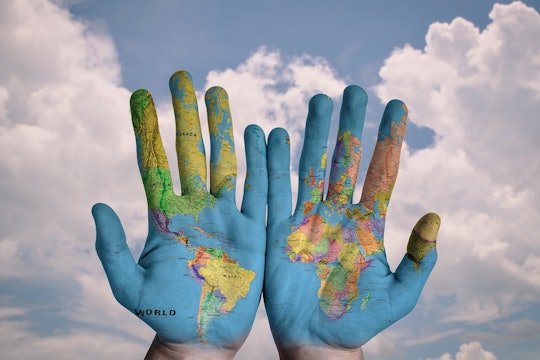Sometimes it's easy to take for granted all the wonderful perks of living on the big blue marble called Earth. From lush green forests and waters teeming with life to frozen tundras and arid deserts where only the most adept organisms can survive, this planet is truly awe-inspiring and definitely deserves to be appreciated. Yet do you ever wonder how certain traditions got their start? For instance, why do we celebrate Earth Day? Besides appreciating the amazing and varied landscapes this planet has to offer, Earth Day gives people a chance to make the world a better place.
And when you think about it, it's not a lot to ask for humans to do their part when it comes to protecting, preserving, and securing the well-being of Earth. Thankfully, millennials are quickly becoming known as the Green Generation, favoring sustainability over convenience and being more environmentally conscious than ever before. So this April 22, consider taking a moment to learn about the incredible history of Earth Day and why it's so important, not just for you and me, but for the environment, animals, and generations to come. Who knows? You may even be inspired to get involved or look out the window with a new-found perspective after learning why we celebrate Earth Day.
1
How Did Earth Day Come To Be?
In 1969, after a massive oil spill in Santa Barbara, California, the then-Senator Gaylord Nelson of Wisconsin was so affected by the wide-scale devastation he saw that he was inspired to raise awareness about the damage pollution can cause. After rallying together activists, researchers, and experts from various political and environmental fields, Nelson held the first Earth Day on April 22, 1970, according to Earth Day.org, with an amazing 20 million total supporters across America.
Nelson was able to tap into and give direction to a long-brewing sentiment that the Earth did indeed need help. The high standards for water quality, clean air, and the protection of endangered species that seem commonplace now are all possible because of the awareness the inaugural Earth Day raised. According to Live Science, Nelson's actions resulted in public support for the creation of the Environmental Protection Agency (EPA) and contributed to the passage of the Clean Air Act, the Water Quality Improvement Act, the Endangered Species Act and several other environmental laws.
2
Why Is Earth Day Held On April 22?
Though some demonstrations were held during the Spring Equinox in the beginning of the environmental awareness movement of the early '70s, April 22 is the official date of Earth Day. But do you ever wonder what the significance of that specific day is?
It turns out that Nelson believed that impassioned college students would be the backbone necessary to bring about the shift in global thinking. According to Earthysky.org, he decided that April 22 would be best opportunity to reach out to students on college campuses nationwide.
In addition to conveniently working around academic schedules, it was also a nod to another significant environmental celebration, Arbor Day. The event synonymous with tree-planting and taking pride in performing civic duties for the community was originally held on April 10. In 1855, when Arbor Day was declared a legal holiday, it was changed to April 22 to commemorate the birthday of its founder, J. Sterling Morton, an environmental activist in his own right.
3
Who Benefits From Earth Day?
Even though Earth Day has its roots (pun intended) firmly planted in America, in 1990 the event was celebrated globally in over 140 nations with a whopping 200 million people participating, according to History.com. The number continues to grow as the world becomes even more connected thanks to social media networks and increasing accessibility to the internet.
According to a study from the World Health Organization published in The New York Times, the top polluted cities are in India. Furthermore, the Gangese River in India is also the most polluted river in the world, according to Weather.com. But before you get bummed out about all the disheartening statistics, hope is on the horizon.
The Earth Day Network (EDN), which is the official organization of Earth Day, has centers across the world and has seen significant progress specifically in India. Their permanent program, EDN India, is located in Kolkata and they focus on "renewable energy, sustainable urban development, mobilizing the youth, building environmental stewardship, increasing green cover, and fostering clean energy education amongst women in rural areas."
Beyond borders and in your own backyard, Earth Day unites communities for the common goal of a clean, safe, and sustainable environment that will benefit all the creatures who share this planet.
Want to get involved? Check out The Earth Day Network's resources to get started.
